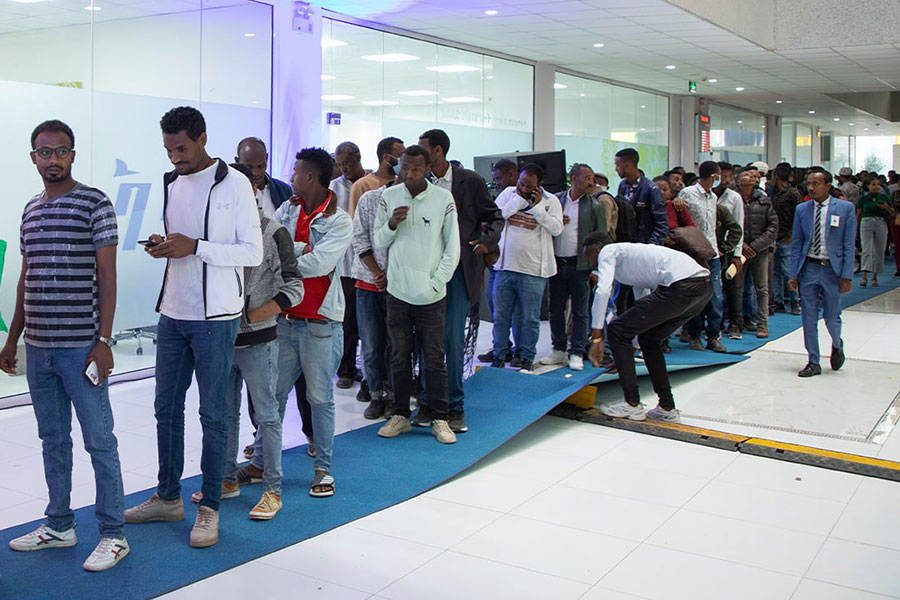
Viewpoints | Jul 05,2025
Oct 3 , 2020
By Ngaire Woods
At the recent opening of the United Nations General Assembly, UN Secretary-General António Guterres warned that the United States and China could “split the globe” into separate trade and financial blocs with diverging internet and artificial-intelligence capacities. Moreover, he said, such a “Great Fracture” between the world’s two largest economies could become a geostrategic and military divide.
The emerging Sino-American tensions in international organisations are indeed alarming. US President Donald Trump’s administration, having previously accused the World Health Organisation (WHO) of cozying up to China, has announced its intention to withdraw the US from the agency and is withholding funding, thus depriving the WHO of its largest single financial contributor. The US has also stalled the World Trade Organisation’s (WTO) dispute-settlement system by vetoing the appointment of new judges to its appellate body.
Fortunately, however, three strands of multilateralism will contain the risk of a great superpower fracture.
First, multilateral organisations are changing not collapsing. China is not seeking to destroy the international institutions that America established and led in the aftermath of World War II. On the contrary, China is seeking to increase its influence within these organisations, not least because it is thriving within the system they uphold.
After the US announced that it was withdrawing from the WHO, China pledged to give it two billion dollars over two years to help it fight the COVID-19 pandemic. And after the US sought to prevent the WTO’s appellate body from functioning, China circulated a reform proposal aimed at strengthening the Organisation.
In the UN, China is now the second largest contributor to the general budget and to the peacekeeping budget. Chinese officials now head four of the UN’s 15 specialised agencies. And in the International Monetary Fund (IMF) and the World Bank, China is now the third most powerful member state, with its own seat on the executive board and a Chinese official in the senior management team.
We are thus witnessing two economic superpowers competing for positions within agencies that set and monitor global rules. Whereas China, the newcomer, is using carrots to advance its position, the US (not for the first time) is using sticks – threats of disengagement and defunding – to get its way.
The key for other countries will be the quality of these international organisations’ leadership – as was the case during the Cold War, when the US dominated such institutions. In that era, for example, UN Secretary-General Dag Hammarskjöld neatly sidestepped the US-Soviet stalemate by introducing international peacekeeping overseen by the UN, while World Bank President Robert McNamara used his authority and mandate to expand the Bank’s membership and activities.
Countering the great fracture will require leaders who can mobilise coalitions of countries other than China or the US to counter a dominant member’s views and who can maximise the impact of their organisations’ resources, staff and policies. Without such leaders, rival superpowers’ vetoes are almost certain to paralyse or marginalise international organisations. These considerations will be vital in the upcoming choice of a new WTO director-general to succeed Roberto Azevêdo, who recently stepped down a year before his current term was due to end.
A second reason to think multilateralism will survive is that, like the US and the Soviet Union during the Cold War, both China and America are using multilateral arrangements to cement relations with their respective allies. Each superpower uses institutions that it dominates, such as the Washington-based Inter-American Development Bank (where the US has 30pc of the voting power and China has 0.004pc), and the Beijing-based Asian Infrastructure Investment Bank (where China has 29pc of the voting power and the US is not a member).
Classical realists would argue that such balance-of-power politics necessarily sacrifices the sovereignty of small states, as superpowers strong-arm them into joining their alliances to fight the existential threat posed by their rival. But the history of the Cold War shows that formal institutions within each side’s alliance can give smaller states some influence over the rules, which can, in turn, moderate superpower competition.
For example, America’s traditional dominance of the IMF resulted in lending practices and policies that were tightly aligned with US national-security priorities. But formal and informal agenda-setting and decision-making power within the IMF in the 1980s offered opportunities for European and other states to influence the rules. Likewise, multilateralism within today’s US and China-led alliances could moderate the current superpower rivalry.
The third strand of multilateralism that mitigates the risks posed by the Sino-American rivalry recalls the early nineteenth-century Concert of Europe, whereby the great powers of the time sought to resolve matters of mutual interest through multilateral consultations. The effectiveness of this arrangement lay in its members’ shared interest in preserving the status quo.
Today, the leaders of the world’s largest economies have a similar common interest in preventing either the pandemic or a global financial crisis from disrupting the international status quo. At this April’s summit of G20 leaders - principally a crisis-management committee - they pledged collectively not only to use formal international institutions to tackle the COVID-19 crisis, but also to coordinate some of their own fiscal and monetary-policy responses, and to work to resolve trade disputes. G20 leaders will meet again in November to consider further possible steps.
Although China and the US are strategic rivals, each depends on global markets, finance, and innovation, and needs to co-opt other countries and regions to sustain its own power. For this reason, both will use multilateralism, formal and informal, to protect the system within which they have flourished and to solidify the alliances with which they intend to chart their future course.
PUBLISHED ON
Oct 03,2020 [ VOL
21 , NO
1066]


Viewpoints | Jul 05,2025

Featured | Aug 22,2020

Viewpoints | Sep 01,2024

Viewpoints | Apr 04,2020

Sunday with Eden | Mar 12,2022

My Opinion | Sep 28,2019

Commentaries | Sep 11,2020

Agenda | Jul 17,2022

Viewpoints | Nov 06,2021

Editorial | Jan 25,2020

My Opinion | 131819 Views | Aug 14,2021

My Opinion | 128203 Views | Aug 21,2021

My Opinion | 126147 Views | Sep 10,2021

My Opinion | 123767 Views | Aug 07,2021

Dec 22 , 2024 . By TIZITA SHEWAFERAW
Charged with transforming colossal state-owned enterprises into modern and competitiv...

Aug 18 , 2024 . By AKSAH ITALO
Although predictable Yonas Zerihun's job in the ride-hailing service is not immune to...

Jul 28 , 2024 . By TIZITA SHEWAFERAW
Unhabitual, perhaps too many, Samuel Gebreyohannes, 38, used to occasionally enjoy a couple of beers at breakfast. However, he recently swit...

Jul 13 , 2024 . By AKSAH ITALO
Investors who rely on tractors, trucks, and field vehicles for commuting, transporting commodities, and f...

Jul 5 , 2025
Six years ago, Ethiopia was the darling of international liberal commentators. A year...

Jun 28 , 2025
Meseret Damtie, the assertive auditor general, has never been shy about naming names...

Jun 21 , 2025
A well-worn adage says, “Budget is not destiny, but it is direction.” Examining t...

Jun 14 , 2025
Yet again, the Horn of Africa is bracing for trouble. A region already frayed by wars...

Jul 6 , 2025 . By BEZAWIT HULUAGER
The federal legislature gave Prime Minister Abiy Ahmed (PhD) what he wanted: a 1.9 tr...

Jul 6 , 2025 . By YITBAREK GETACHEW
In a city rising skyward at breakneck speed, a reckoning has arrived. Authorities in...

Jul 6 , 2025 . By NAHOM AYELE
A landmark directive from the Ministry of Finance signals a paradigm shift in the cou...

Jul 6 , 2025 . By NAHOM AYELE
Awash Bank has announced plans to establish a dedicated investment banking subsidiary...